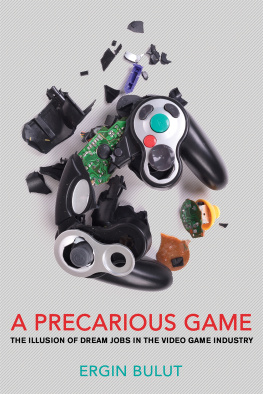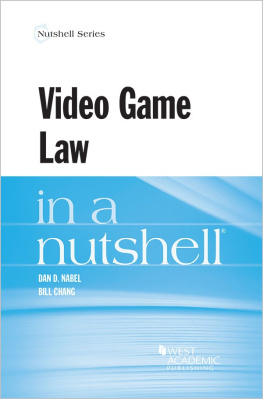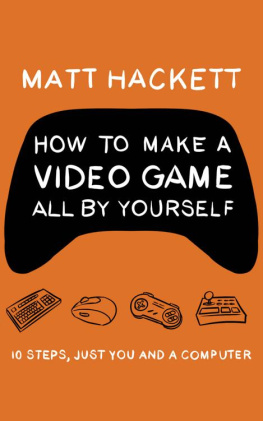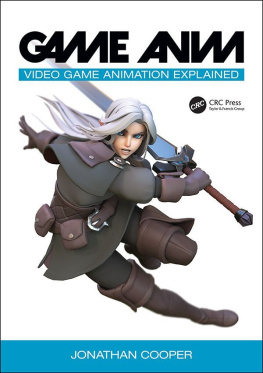Preface
At the beginning of each academic semester, I ask undergraduates majoring in media studies what their postgraduation plans are. Regardless of the industry they would like to get into, they want to do something fun or something they love. They desire creative jobs. Not interested in joining the white-collar workforce, my students are keen on being employed in workplaces where informality rules.
The video game industry is an ideal venue where job descriptions come very close to the aspirations of my students. Producing video games is definitely fun and glamorous. In fact, video game industry jobs are described as among the best jobs that U.S. workplaces offer. With its transnational connections and a truly networked labor force, the industry does offer lively workspaces. It is also positioned as an industry that thrives despite the adverse effects of the economic downturn.
This book suggests that things are a bit more complicated. By delving into the everyday experiences of video game developers in a studio that I call Desire, I reveal how the glamorous working lives of game developers are equally precarious and unpredictable, depending on many other factors that they cannot always control. In fact, the whole industry is structured around various forms of inequalities and surrounded with illusions about what it means to do what one loves. Even when Desires developers work really hard, love what they do, and produce profitable games, their economic and social well-being do not always thrive equally well, rendering them anxious about their futures.
Not all of Desires workers are employed on equal terms, either. There are the more privileged core creatives, such as programmers, artists, and designers, and there are the marginalized video game testers, whose labor is undervalued compared to the rest of the workforce. Game workers partners reproductive labor is also rendered invisible, even though they are vital to the success of a whole industry. There are cultural inequalities where a predominantly white-male industrys definitions of fun give us questionable game content with respect to gender and race. That is, work itself is extremely racialized and gendered. So, then, it seems that inequality is not a bug but a major feature of this industry. Doing what you love as a game worker can be a mixed blessing, because failure and production errors are endemic to this highly innovative industry, even though it is represented and imagined as a meritocratic utopia.
The fusion of work and play, desire and work, and performing a labor of love have become a hegemonic narrative across the globe. The video game industry stands out like a natural center of this fusion in the form of a dream job. This book interrogates the politics of this dream through the lens of inequality. It poses one main question: Who can play and who has to work in this industry? Grasping the personal, social, and emotional cost of racialized and gendered labor practices through the lives of Desires creative workers, the present work critiques liberal conceptions of creativity and discourses around quality of life in this unpredictable industry. It politicizes love at work and invites readers to consider universal basic income, unionization, and a radical postwork imagination. By pointing to the illusions of game development as a dream job, it emphasizes the immediate necessity to make radical demands about how we can possibly disautomatize ourselves, deconstruct our naturalized commitment to work, and liberate play from its one-dimensionality.
I hope this book is a thoughtful and provocative call for becoming killjoys against a supposedly ludic future, which in fact is very much limited to instrumentalized and unequal relations of social domination.
Acknowledgments
Intellectual life has never been easy in Turkey, but I wouldnt have imagined the level of the uncertainty it has reached since I returned home in 2014. To that end, I would like to thank friends, colleagues, and institutions that supported me as I wrote this book.
First I want to thank numerous game developers and their partners who shared their stories with me amid their hectic lives. I hope this book contributes to the formation of a more equal video game industry. I also want to thank anonymous reviewers for their feedback, which has significantly helped me to reframe the book. Let me also thank Fran Benson and the editorial team for believing in and helping with this project.
kran zkan, Leman nar, Meltem ullu, Susan Robertson, Aye Bura, and zden Cankaya have been lifelong mentors and sources of inspiration. I am grateful.
Frat Kaplan, Evren Diner, Emre Ergven, Seil Ylmaz, Yasin Kara, Asl Filiz, Nurin leri, and Bora Erda deserve special thanks for being wonderful friends and intellectual interlocutors since the 2000s. My friends for life, you all rock! Mustafas and Duygus existence in my life has been nothing other than immense joy. They rock! Our WhatsApp group How I Met Your Mother has been my daily feed of political news, Brazilian music, and laughter. I am grateful to Garett and May for being my family in the United States. I thank Serdar, Ayegl, Giray, Asl, Gkhan, Emre, Eren, Deniz, and Ozan for immensely enriching my life back in the United States.
I fondly remember my memories at the University of Illinois and want to thank my friends and colleagues for listening to the stories in this book so many times. Thank you, Bryce Henson, Karla Palma, Nina Li, Darren Stevenson, Safiya Umoja Noble, Sarah Roberts, Matt Crain, Mandy Trger, Nick Rudd, Alicia Kozma, Martina Baldwin, and Arnau Multu. Robert Mejia has been a wonderful colleague to work with and learn from.
Let me also thank Srirupa Roy, Thomas Allmer, Ben Birkinbine, Nina Huntemann, Aphra Kerr, Zsuzsa Gille, Kylie Jarett, Dal Yong Jin, Dan Schiller, Lisa Nakamura, John Nerone, Fazal Rizvi, Michael Peters, Aswin Punathambekar, Zeynep Devrim Grsel, Suncem Koer, Casey ODonnell, Michelle Rodino-Colocino, Jack Bratich, Mutlu Binark, James Hay, Bilge Yeil, Nick Dyer-Witheford, Victor Pickard, Anita Say Chan, Jack Qiu, Winifred Poster, Luke Stark, Rolien Hoyng, Murat Es, Alison Hearn, and Enda Brophy for their support, friendship, and conversations in various academic venues. Many thanks to Jayson Harsin for his support and solidarity. Nicole Cohen and especially Greig de Peuter deserve special thanks for providing comments and feedback at various occasions on the earlier forms of the manuscript. Vicki Mayers work has been a formative influence in this project. I am especially thankful for her encouragement in the earlier phases of my career. With her immense intellectual inspiration and political energy, Paula Chakravartty has been a formidable mentor and I am grateful.
Since I became a faculty member at Ko University, Bilge Ulutrks invisible support at the Suna Kra Library has been priceless. I want to thank my colleagues at Ko University, especially Dikmen Bezmez, ala Turgul, Didem Pekn, pek elik Rappas, etin elik, Gizem Erdem, and Lemi Baruh. Dean Aylin Kntays leadership and support is much appreciated. My conversations with Can Nacar and Burak Grel have helped me shape various parts of the manuscript. Erdem Yrks motivation has pushed me along the way. Alexis Rappas deserves special thanks for numerous conversations in our hallway. Thanks to Megan MacDonald, who kindly read and gave feedback on portions of the manuscript.
Students at Ko University have been delightful to work with. I want to thank Ege, Suzy, Sidar, Zeynel, Aybike, nder, Mert, and Asl for both insightful conversations and research support.








